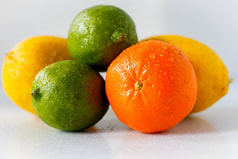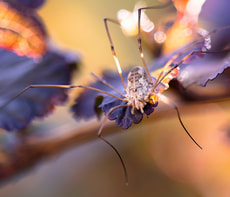 It’s common knowledge that vitamin C is helpful to our immune system and we often hear about it during the winter “cold” season. Did you know that most all animals make their own vitamin C and don’t need to obtain it through food? What about humans? This would have been convenient for sailors when they didn’t have access to citrus and developed scurvy. Somewhere in the human lineage, we lost the ability to make vitamin C. We have all the genes to make it happen, but one is turned off or broken. L-gulonolactone oxidase, GULO, is the culprit. So why aren’t we extinct because of this mishap? Science shows that the mutation originally happened to a population of mammals who had a diet rich in vitamin C so the body no longer needed to make it and scurvy wasn’t an issue. We’ve evolved since then and don’t all live in climates where foods in vitamin C hang from trees. With that said, it’s important to eat foods rich in vitamin C. Fruit and vegetables are important sources of ascorbic acid (vitamin C). It’s an antioxidant and plays an important role in the production of collagen in our bodies. This is a major player for ligaments, bones, skin, tissue, discs, tendons, blood vessels and more. Vitamin C also helps eye health. There are different forms of vitamin C on the market in the form of supplements if you aren’t able to achieve the daily recommended allowance in your diet. It’s good to know that some ascorbic acid supplements are harder for the body to absorb and some are less harsh such as liposomal. Check out this helpful fact sheet from the National Institutes of Health. By the way, think scurvy is a thing of the past? It’s on the rise again in England. Between 2009-2014, hospital admissions related to scurvy rose to 27%. Grab a lime! #mindbodyyou #vitaminC #celestecooperpeel
1 Comment
 Being in nature is a great way to drink in mindfulness. We also want to protect ourselves from those pesky bugs and ticks. Personally, I’m not a fan of bug sprays that are on the market. The main active ingredient in most sprays is DEET. DEET (N,N-Diethyl-meta-toluamide) can cause adverse reactions which may include seizures, cardiovascular issues and more. What should you do? I use 100% organic and therapeutic grade essential oils for quite a bit in my life from promoting relaxation to sleep to bug spray. As far as sprays for outdoor pests, I believe this is nature’s way of protecting itself since essential oils come from plants. With the increase in pests and ticks this summer in the south due to the warmer winter, we can create our own arsenal of sprays and ensure we don’t absorb harmful chemicals. Here’s my personal recipe and each of these oils has research to back it up. Note: please ensure that you use therapeutic grade oils and perform a patch test on your skin prior to using. Visit this article for more on essential oil safety. Summer Spray
#mindbodyyou #essentialoils #bugspray #celestecooperpeel |
AuthorWrite something about yourself. No need to be fancy, just an overview. Archives
May 2024
Categories |

 RSS Feed
RSS Feed